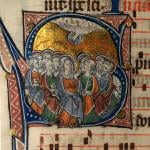In his 1987 book on Thomas’s ecclesiology, George Sabra argues that Thomas does not teach that the church is a continuing incarnation. He definitely rejects any notion that the church is deified. If the notion of “continuing incarnation” simply means that the church continues the work of the incarnation, it comes closer to Thomas. But even here, Sabra says, Thomas is too conscious of the once-for-all character of Jesus’ work to use language of continuation or prolongation. Instead, he uses... Read more




















